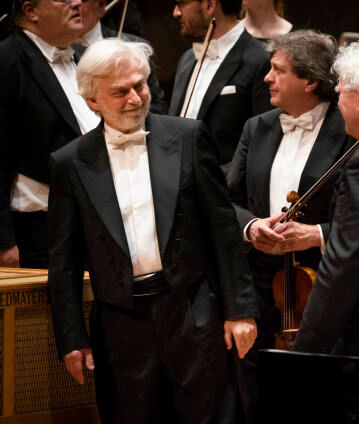Krystian Zimerman and Simon Rattle perform Bernstein’s “The Age of Anxiety”

As chief conductor of the Berliner Philharmoniker, Simon Rattle has impressively shown again and again what variety and richness are couched in the term “modern music” – and he does so again at this concert. We hear three short premieres, enter the world of film and television with Robin Hood and Tom and Jerry, and experience Bernstein’s jazz-influenced Second Symphony, with world star Krystian Zimerman as piano soloist.
W. H. Auden was a charming moralist, wistful yet pitiless, affectionate yet weighed down by emotional pain. With The Age of Anxiety, he created a historical and psychological diagnosis of the soul and of the time in the guise of a Baroque pastoral poem: “Lies and lethargy police the world / in its periods of peace. What pain taught / is soon forgotten; we celebrate / what ought to happen as if it were done, / Are blinded by our boasts. Then back they come, / The fears that we fear.” The outer frame of the action is provided by the four protagonists who fall into conversation in a New York bar and – as the alcohol breaks down the barriers of internal censorship – discuss the war, their own world view and their faith: a fictional conversation between average people, the chorus of a drama (that fails to materialise) and a hymn and elegy.
The poem, which won Auden the Pulitzer Prize, inspired Leonard Bernstein to compose his eponymous symphony: “The essential line of Auden’s poem,” said the composer, “is the record of our difficult and problematic search for faith. In the end, two of the characters enunciate the recognition of this faith – at the same time revealing an inability to relate to it personally in their daily lives.” In the score, which mixes a kaleidoscopic variety of different musical styles, the concertante solo piano takes on a symbolic function: “The pianist,” as Bernstein wrote, “provides an almost autobiographical protagonist, set against an orchestral mirror in which he sees himself, analytically, in the modern ambience.” In the Berlin Philharmonie, no less than Krystian Zimerman will take on the solo part, interspersed with jazz-style syncopation, to which Bernstein subsequently added an extensive cadenza before the final coda.
Following the symphony, Sir Simon and the orchestra present three new songs by Andrew Norman, Magnus Lindberg and Brett Dean as part of the Philharmoniker’s “tapas” series of commissioned works with a duration of approx. six minutes. The evening comes to a close with an atmospheric trip to the genre of film music: Following Scott Bradley’s incidental music for the Tom and Jerry animated series, the programme continues with the symphonic orchestral portrait The Adventures of Robin Hood arranged by John Mauceri, based on the original score for the 1938 film. The music is by Erich Wolfgang Korngold who, thanks to an exclusive contract with the Warner Brothers film empire, became one of the most successful – and richest – film composer of all time.
© 2018 Berlin Phil Media GmbH